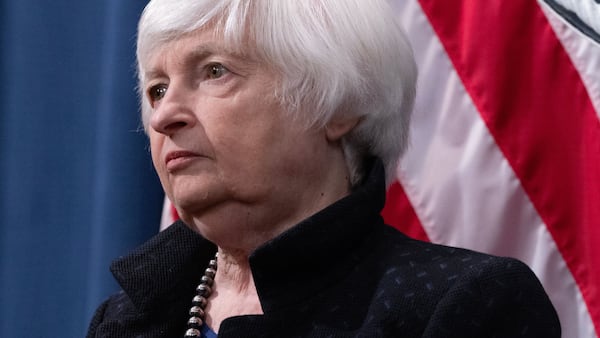- The SEC did not sign on to an interagency settlement with crypto exchange Binance.
- The decision allows the SEC to retain an enforcement action against Binance that looks like a slam dunk for the watchdog.
- A win in that case would give the SEC more firepower to regulate crypto.
It looked odd.
The Securities and Exchange Commission was notably missing from last week’s historic inter-agency settlement with Binance — where the crypto exchange got slapped with a $4.3 billion penalty and replaced its CEO.
But in doing so, the SEC scored a strategic victory.
“The SEC faced complex strategic decisions” at the time, Aaron Unterman, managing director at XReg Consulting, told DL News.
“Ultimately,” he said, “if the SEC had been part of the settlement agreement, it would have lost the opportunity to set a legal precedent with regards to the issue of whether crypto assets are in fact securities.”
In other words, staying out of the Binance battle helps SEC Chair Gary Gensler in his battle to be the primary regulator of crypto.
Gensler’s strategy
The SEC this year filed a series of similar lawsuits against crypto exchanges Binance, Coinbase, and Kraken.
These suits all hinge on the assumption, often repeated by SEC Chair Gary Gensler, that all tokens are securities, and therefore the agency has free rein to regulate the industry.
For the SEC, settling this pivotal question of its jurisdiction via the courts is a far higher-stakes win than even a blockbuster deal with the world’s biggest exchange.
Binance is now subject to a monitoring programme so intense that Stark referred to it as a ‘financial colonoscopy.’
“Settlements do not create legal precedents, and are therefore not helpful when enforcement matters are considered by the courts,” Unterman said.
“The bigger issue that’s still up in the air is whether the SEC has jurisdiction over crypto assets. That’s the fight, are they investment contracts,” he added.
Settling with Binance
Treasury Chair Janet Yellen and other officials signed on to a deal that saddles Binance with a monitoring programme.
Co-founder and CEO Changpeng Zhao stepped down, pleaded guilty to felony charges, and agreed to pay a $50 million fine.
In signing on to the deal, the Justice and Treasury Departments, as well as the Commodity Future Trading Commission, settled their own, individual suits against the exchange.
But the SEC’s lawsuit is still ongoing.
“You would have expected the SEC to be part of this settlement. That would have been a big win for them,” Unterman told DL News.
“It’s one of the largest settlements of all time, and it would have demonstrated intergovernmental coordination. It would have created the inference that a major firm was submitting to SEC jurisdiction.”
Rather than getting a quick win, Unterman said, the SEC’s absence hinted at a canny long-term strategy.
Settling with Binance, even in the context of a major deal, might have negated what the agency surely anticipates as its own, more important court victory that could set legal precedent backing its ambitions to police the entire crypto market, he said.
Lay-up to a slam-dunk
A court win against Binance just got a lot easier for the SEC.
It will “transform the SEC enforcement action against Binance from a lay-up to a slam dunk,” former SEC chief of internet enforcement John Reed Stark wrote in a LinkedIn post.
That’s because Binance is now subject to a monitoring programme so intense that Stark referred to it as a “financial colonoscopy.”
That monitor will collect a trove of data on Binance’s operations — and the SEC will have access.
That will almost certainly bolster the agency’s legal case, Stark wrote.
“A new evidentiary record of wide-ranging allegations and assertions can now provide formidable cannon fodder for SEC investigators and litigators to strengthen their Binance-related accusations and contentions,” he wrote.
In short, the SEC has benefited from the Binance action without having to give up its own lawsuit and interests, Stark said.
SEC strategy
The SEC has also, by staying out of the multi-agency settlement, been able to line up a win the turf war between it and the CFTC.
Since Gensler upped his scrutiny of crypto two years ago, he has asserted that the majority of digital assets fall under the aegis of his agency.
The CFTC, meanwhile, has laid its own jurisdictional claims to tokens like Ethereum’s Ether.
The refrain that crypto assets are securities has been a guiding principle behind the slew of lawsuits the SEC has filed against major exchanges providing services to US customers.
The SEC filed the latest of these suits — against Kraken — in a San Francisco federal court last Tuesday.
Two other two suits were filed in June, one against Binance and one against Coinbase.
The SEC’s allegations in the three enforcement actions share similarities — each exchange is said to have failed to register with the commission while operating de-facto securities exchanges.
These are complex, technical arguments, but underpinned by the simple idea that the tokens listed on these exchanges represent investment contracts, and therefore fall under the SEC’s authority.
The courts haven’t always backed the SEC’s assertion.
In July, a judge ruled that Ripple Labs’ sales of XRP tokens did not constitute investment contracts.
The SEC legal team may believe it needs more persuasive arguments. And the Binance case could provide that.
Binance did not return requests for comment. The SEC said it does not comment on ongoing litigation.









